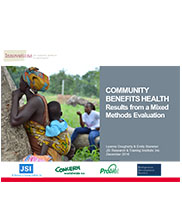This slide doc presents the results of an evaluation of the Community Benefits Health pilot in Ghana. The objective of the pilot was to influence a woman’s social network and generate community- level support, leading to improved knowledge, attitudes, self-efficacy, and maternal health behaviors.
Despite improvements in maternal health in Ghana over the last 20 years, maternal mortality remains high, and the country fell short in meeting the 2015 Millennium Development Goal (MDG) targets. The maternal mortality ratio in the country fell from 634 maternal deaths per 100,000 live births in 1990 to 319 per 100,000 live births in 2015, but this is short of the 2015 MDG goal (WHO, UNICEF, UNFPA, World Bank Group, and the United Nations Population Division, 2015). High rates of poverty in rural areas coupled with cultural traditions that foster low levels of women’s empowerment continue to undermine health outcomes, particularly in Ghana’s Upper West region.
The Community Benefits Health (CBH) pilot was part of Concern Worldwide’s Innovations for Maternal, Newborn & Child Health (Innovations), an initiative that sought to identify, support, and field-test bold innovative ways to overcome barriers to delivering proven solutions to women and children.
The CBH pilot aimed to provide the government of Ghana with an innovative solution to address knowledge, social norms, and cultural practices related to maternal, newborn, and child health (MNCH) at the community level through the introduction of a community-based non-monetary incentive and a comprehensive health messaging strategy. At the heart of the CBH pilot was the focus on normative behavior change, which emphasizes and takes advantage of social structural factors that influence behavioral choices, including network structures, nature of relationships, and equitable availability of social and material resources. By shifting attitudes and behaviors of key members of the community, social norms around care-seeking behavior may also improve, resulting in improved health outcomes.
Pronet North, the implementing organization, collaborated with the Ghana Health Service (GHS) to introduce the community-based behavior change intervention to address the social norms and cultural practices influencing the use of select maternal health and breastfeeding behaviors. JSI Research & Training Institute, Inc., served as the global research partner.
Few evaluations have sought to understand how a woman engages with her community, including the nature of her relationships, the types of advice or support received, and the characteristics of her social network that may increase her receptivity to adopting improved maternal health behaviors. This evaluation sought to understand the effect of the CBH pilot on improving maternal health behaviors by influencing social networks and generating community-level social support.
Leanne Dougherty and Emily Stammer, JSI Research & Training Institute, Inc. 2016.


